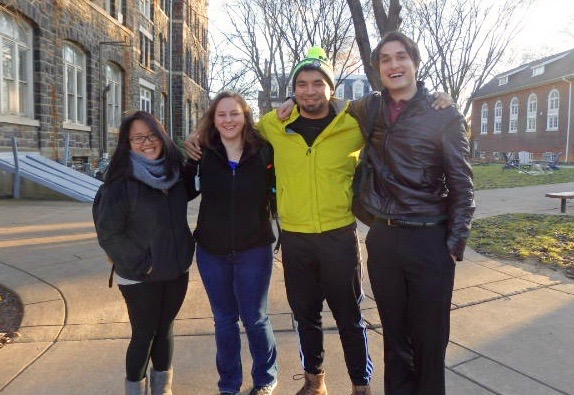Commuting to Moravian : The Good, the Bad, and the Routine

Left to right: Vina Aguirre, Katelyn Snyder, Marlon Moraga, Max Kraft
For commuting students at Moravian College, driving to school each day can feel like driving to a full-time job. While the luxury of waking up five minutes before class and the convenience of walking to class from home, in general, is non-existent for the commuter, there may be other perks that make up for the lack of sleeping-in and no-hassle parking convenience, such as returning to a private and comfortable home with family. Some other perks of being a commuter include an unlimited supply of free food that one actually likes – assuming that someone in the house goes grocery shopping regularly. Or, a spacious, lounge-tastic atmosphere that typically involves binge-watching Netflix while sprawled across the couch in the living room, 2 AM snacking in a stocked kitchen, and never needing to pick dirty clothes up off the bedroom floor. While the residential student may have a similar free-time schedule, the commuter seems to lead a slightly different lifestyle.
Nearly 2,000 students attend Moravian College, 30% of whom commute. That accounts for some 570 commuting students. This semester, I interviewed a few to gain some insight on the pros, cons, and overall general thoughts about being a commuter.
The Good
Vina Aguirre, a freshman who commutes 5 minutes to campus from Bethlehem twice every day, seems to have adjusted to the college lifestyle. Despite the short distance, Vina has centered her social life around Moravian.“I’m actually here all day because I’m involved with clubs, and I’m friends with a lot of residents!” she says. “It’s great. I even come here during the weekends, when I’m not working, and hang out with my friends.”
Makenna Masenheimer, a sophomore, seems to enjoy the privacy of her space at home. “I chose to be a commuter to save money, and to take advantage of my comfortable room and good food,” she says. “I also did not want to be tied down to a college campus. This way I can be more involved with my siblings’ lives.”
Max Kraft, a junior, seems to appreciate the freedom that comes with driving to school and work. “I can hold down a job while being a commuter,” says the Bethlehem resident who works full time. “Commuting helps me with my stress because I can be a master of my own living space. I don’t have to worry about the invasion of privacy, or being distracted by roommates.”
The Bad
While the convenience of living at home is a wonderful perk to being a commuter, there are some inconveniences to the commuter’s daily life. Driving times and parking are the biggest hassles that commuters have to factor into their schedules in order to make it to class on-time.
Katelyn Snyder, a junior, with a 30-minute commute from Easton, explains some of the scheduling obstacles she manages on a semester-to-semester basis. “For travel time, especially in the spring semester, since we have to worry about snow more, I will schedule later classes,” she says. “In the fall, I tend to schedule 8:55 AM classes, but in the spring I will schedule, at the earliest, 10:20 AM classes, so that I can shovel out the car if I need to.”
Angel Ringleben, a senior, with a nearly three-hour commute also discusses some time-management issues.“Commuting takes up so much time, on top of doing homework, and staying on-top of my family responsibilities,” she says. “The lifestyle can be awkwardly quiet. You make different bonds with different people, mainly your family.”
The commuter’s social life can also be impacted, as Max adds, “I’m not on campus enough to be involved with social activities. I don’t have the same connections [with on-campus students] for being a commuter.”
And the worst part of being a commuter?
Max: “Parking, parking, all of the parking.”
Makenna: “The traffic, and not having a place to sleep [on-campus].”
Vina: “Definitely parking. It’s really a disadvantage.”
General Thoughts:
While there may be some disadvantage to being a commuting student because of the lack of connection to on-campus activities, the majority of commuters interviewed did not believe that they were missing out on social activities.
Vina explains, with regard to social activities on campus, “If you want to make a good experience, you have to make the effort to do so. I feel like I live here. I joined clubs, and I love it!”
Max adds, “If I really wanted to go to something [on-campus], I would go. Commuting is a burden, but not such a burden that I could not cope with.”
Angel, who used to live on campus, sees both sides. “It’s hard to say [whether I’m missing out on social activities],” she says. “I’ve dealt with everything before, but I would recommend being a commuting student for the personal space commuting offers.”
With regard to personal space, Marlon Moraga, a senior, explains the best perk to being a commuter, “I don’t run into my ex-girlfriend on campus.”
So, to the residential students who are considering whether or not to commute, the advice of current commuters seems to be: Go for it! Depending on how long travel times are, commuting can make all the difference in how one’s day is planned. Still, aside from the actual commute, there are only minor impediments that are easily overlooked for the freedom of driving to and from school, and for the comfort of living at home. Furthermore, the lifestyle of a commuter is not much different from that of a residential student, with the weekends of most commuters involving school work, work, and spending time with family and friends.
As for overcoming those pesky parking and scheduling issues, Katelyn Snyder offers some honest advice. “The fact of the matter is you will have to wake up earlier if you are a commuter, because you have to factor in the time it takes you to get here,” she says. “Also, if you don’t initially have the organization skills of making and sticking to a schedule, you will quickly develop great organization, because if you don’t, your schedule is chaos.”






